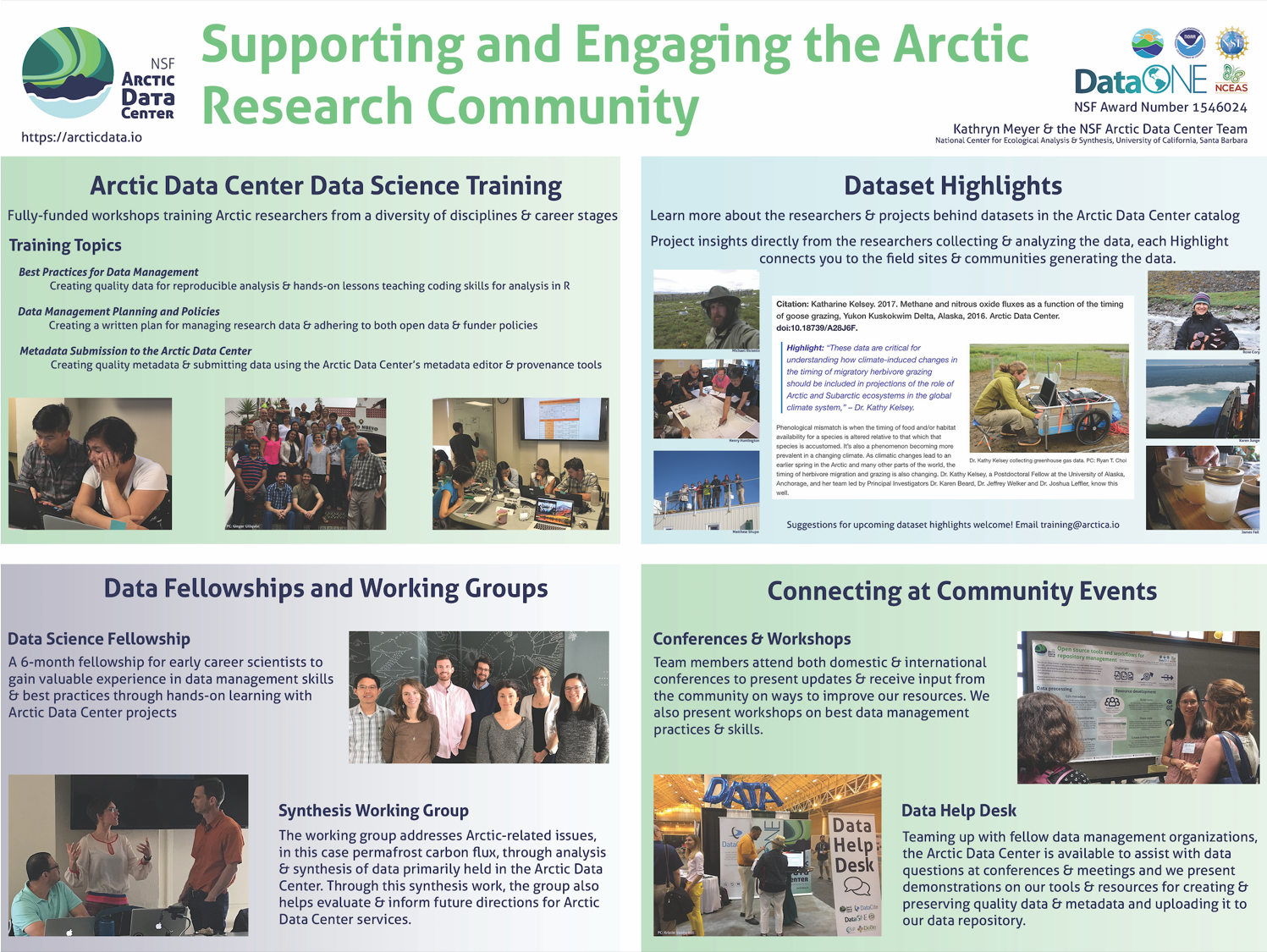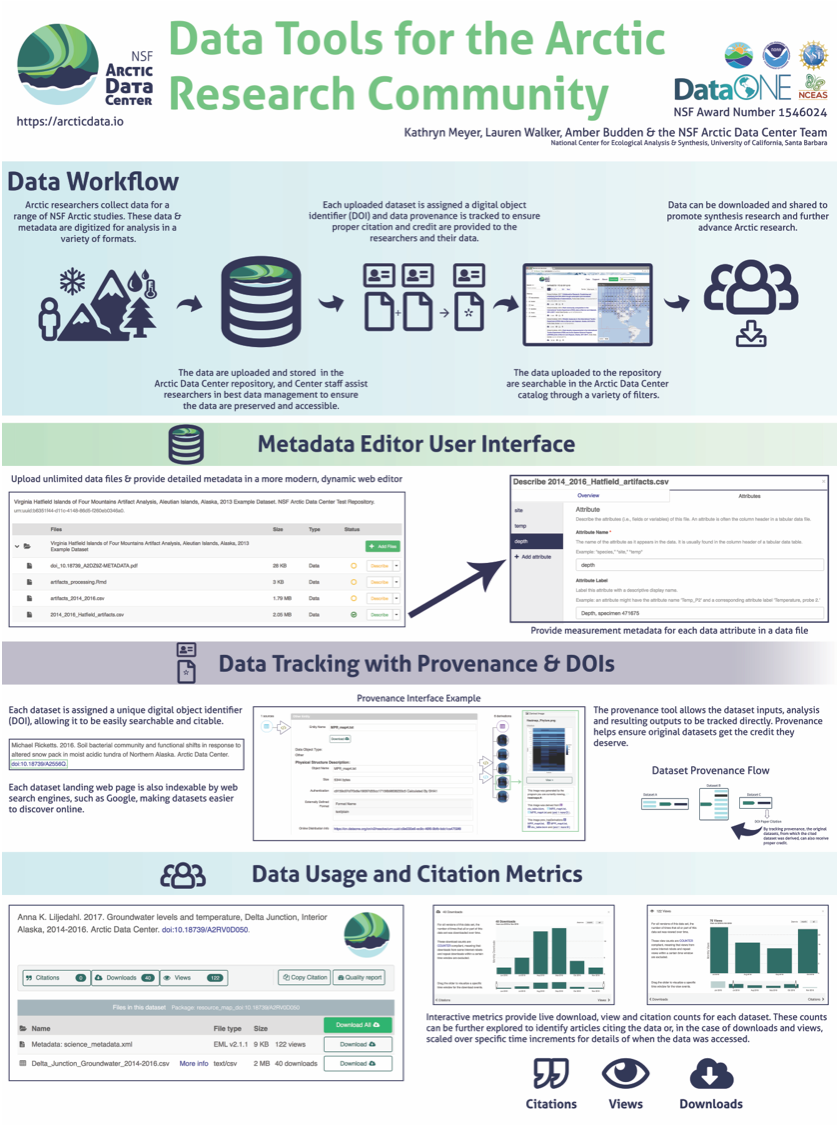Arctic Data Center team members attended the American Geophysical Union (AGU) 2018 Fall Meeting in Washington, D.C., December 10-14, 2018. We were in Booth 510 in the Exhibit Hall throughout the week and presented two discussions/trainings as part of the Data Help Desk’s Data Fair in the AGU Central Theater, Booth 1018 in the Exhibit Hall (abstracts below). Team members also presented posters during the Tuesday, December 11, and Friday, December 14, afternoon poster sessions (poster JPEGs and abstracts below).
Streamlining Data Discovery in the Arctic
Tuesday, December 11th, from 10:30-11:30 (AGU Central Theater, Booth 1018)
The Arctic data community is working to streamline data archiving and discoverability for the Arctic research community through a variety of initiatives, including the NSF Arctic Data Center, DataONE, and the recently established Polar Federated Search Working Group (POLDER). Come learn about advances in our ability to discover and preserve Arctic data, and join in the discussion to share ways we can further support Arctic research, data management, and data preservation.
How to Reproducibly Preserve your Science
Thursday, December 13th, from 13:30-14:30 (AGU Central Theater, Booth 1018)
Being able to reproducibly preserve your science requires creating quality metadata. We’ll teach the basics for writing a quality metadata record to fulfill funder requirements, uphold community best practices, and benefit the research community (and yourself) both now and into the future. The Arctic Data Center’s metadata editor will be used to demo a quality metadata record submission.
Supporting and Engaging the Arctic Research Community
Tuesday, December 11th, from 13:40-18:00 (Convention Ctr, Poster Hall A-C)

The NSF Arctic Data Center is the primary data and software repository for the Arctic section of NSF Polar Programs, but the Arctic Data Center is more than just a data repository. Alongside our efforts to fulfill the mission of helping the research community reproducibly preserve and discover all data, metadata, and software products of NSF-funded science in the Arctic, we are working to support, engage and promote the Arctic research community. Through training workshops, social media engagements, data fellowship programs, and more, we serve as a resource for the Arctic community. Within the last year, we have supported Arctic research collaboration through a funded synthesis science working group and have launched a Dataset Highlights webpage to highlight the scientists behind the datasets in the Arctic Data Center repository. We will discuss these efforts and more as we share ways to use our platform as a data repository to promote further impactful Arctic research and public engagement in the community.
Data Submission Tools and Resources to Support Best Metadata Practices, Data Sharing and Citation in the Arctic Research Community
Friday, December 14th, from 13:40-18:00 (Convention Ctr, Poster Hall A-C)

Serving as the primary data and software repository for the Arctic section of NSF Polar Programs, the NSF Arctic Data Center’s mission is to help the Arctic research community reproducibly preserve and discover all data, metadata, and software products of NSF-funded science in the Arctic. In fulfilling this mission, the Arctic Data Center has developed tools and resources to support and engage researchers in their data submission. The Arctic Data Center recently launched a new version of their metadata editor that has an easier-to-use design and allows more granular metadata descriptions, such as data entity descriptions, and data attribute descriptions. The development team also created a provenance web tool to track and attribute the origin of derived data. To ensure proper data citation, submitters are required to use an ORCiD and datasets are given unique digital object identifiers (DOIs). We will discuss these tools and resources the Arctic Data Center is employing to support and encourage researchers to share their data to increase awareness, usage, and facilitate further collaboration for addressing pressing Arctic research questions.
